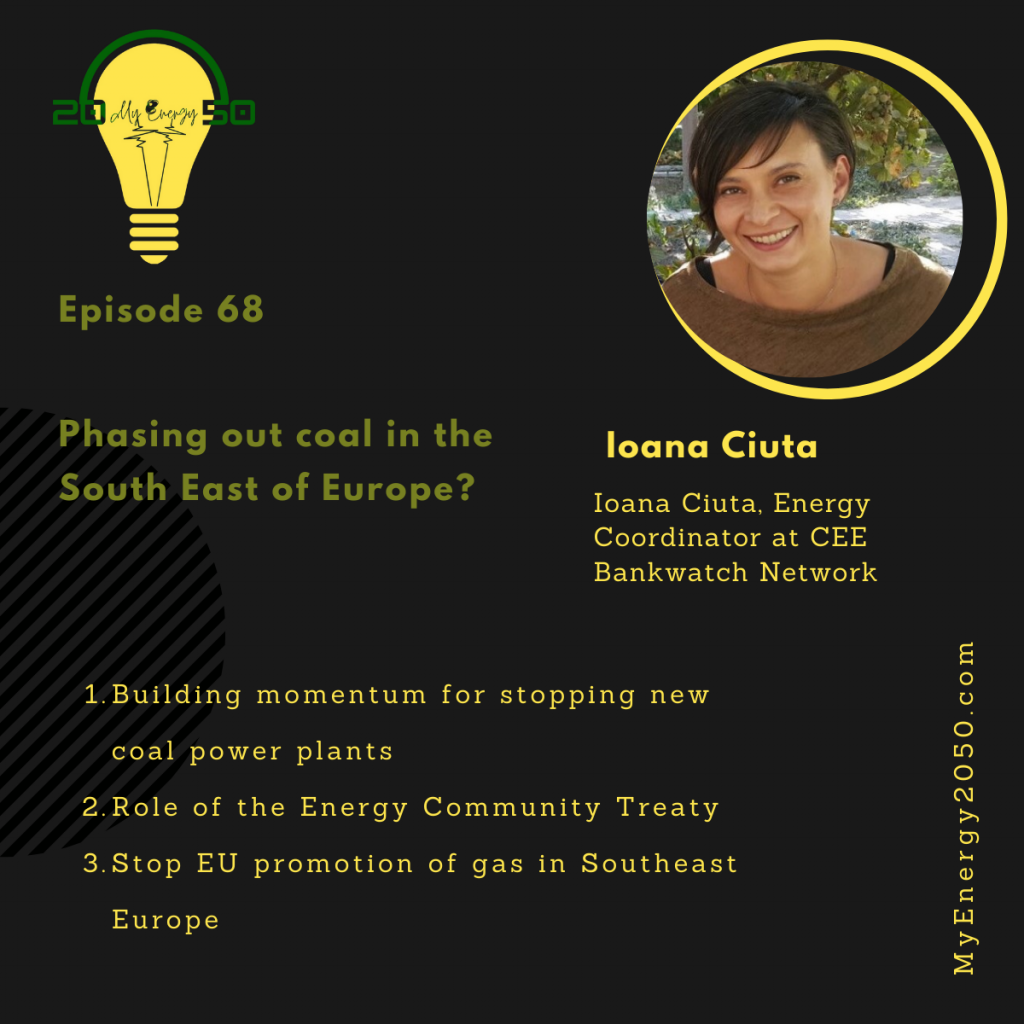This week we speak with Ioana Ciuta, Energy Coordinator at CEE Bankwatch Network.

We’ll be speaking about the Southeast of Europe, in general, historical terms we can use the word Balkans or update it more specifically and use the term Western Balkans for many of the former Yugoslav republics. But in a more specific energy sense, we need to broaden the perspective and include Romania, Bulgaria and of course include Albania.
In this episode, we discuss the role of the Energy Community Treaty keeping these – and some other – countries cooperating with the involvement of the EU and neighboring countries.
As Ioana tells us at the start there was and still is great interest in building coal-fired power plants in the region. But not by private companies, but by governments and utilizing loans from China and other international institutions. As Ioana highlights, the scarcity of financing options says a lot about the changes over the years, that coal is financially unviable for private companies.
But what does it say about governments, like China, Serbia, Bosnia and Herzegovina who see coal as a viable energy source? Bankwatch is working hard to prevent financing to build new facilities to ensure a reduction of emissions and prompt investments into alternative energy technologies. If money from banks is not going to coal, then it can go elsewhere – hopefully into clean energy technologies.
At the beginning of the episode, Ioana describes how she became involved in environmental issues, first with nuclear power than fighting for coal phase-out. This episode provides context to understand the support for fossil fuels in the region and the reluctant uptake of cleaner generation sources, such as renewables. As we discuss there is a difference between EU and national goals and how they are implemented within the region.
The importance of the Balkans lies in the necessity to bring them along in Europe’s energy transition. As I learned from a recent trip to Romania, the rising energy prices are set to derail many household budgets in the region. As Ioana points out, even firewood is increasing in price. Relying on old technologies and resources does not provide households or industries a way forward in this economically deprived region. The lowest cost generation source is not coal. There’s a tremendous need to change ways of thinking and gain acceptance and assistance for new practices and technologies in the energy transition.
This episode and some future episodes looking at Romania and Croatia will provide deeper context to the regions’ challenges in the energy transition. The necessity for innovative thinking and deployment of proven solutions to delivering a socially affordable energy system – within the energy transition.
A final note, this interview was done for my current role as an Open Society University Network, Senior Fellow at Chatham House, The Royal Institute of International Affairs. The funding was generously provided to produce the podcasts until the end of 2022. And the funding was provided to travel to interview a range of experts on how the current energy crisis is impacting different countries around Europe.
Transcript
Full transcript is here (AI generated – there are mistakes) But you can listen along while reading
Outline:
How times have changed in Europe.
0:00
How did you become involved with Bank Watch?
6:34
Government financing plays a strong role in coal and coal fired power plants in the Western Balkans.
11:06
Why are there no sanctions for not complying with what is agreed to by the Energy Community framework?
18:36
Coal-fired power plant in Bosnia and Herzegovina.
23:40
Can coal-fired power plants be competitive on a market-based basis and by private investors? Why does state aid need to be given?
29:10
How much influence does the EU have in energy policy in the region?
36:49
What’s going on in the Balkans? What are the contradictions?
45:02
What are some of the successes that you’ve experienced in your job?
Dr. Michael LaBelle is an associate professor at Central European University in the Department of Environmental Sciences. He produces the My Energy 2050 podcast to change how we communicate and improve the energy transition.
